Due diligence is a process where a buyer has an in-depth look at the business you’re selling to investigate from the inside. As a result, they can make an objective decision about buying your business.
As a business owner wanting to sell a small business, due diligence is the most critical part of this process. That is to say, understanding the importance of due diligence is as important as having a successful sale.
Over 50% of transactions fall apart during due diligence because sellers are not prepared.
Why due diligence is so important
The goal of due diligence is to make sure that all legal and financial issues related to the business are in order. This way, there are no unpleasant surprises if you decide to go through with the sale. This is when you sign a letter of intent and agree on a price before you eventually seal the deal. Before this, the buyer usually has the right to dig into the company’s affairs to conduct a proper check.
Due diligence ensures the buyer has access to important information about the business you’re selling. Therefore, it’s the best way to assess the value of a business and the risks associated with buying it.
Learn what your business may be worth – try our free assessment
The goal of due diligence is to make sure that all legal and financial issues pertaining to the business are in order and that there are no unpleasant surprises should you decide to go through with the sale – this is when you sign a letter of intent and agree on a price before you eventually seal the contract.

The buyer thoroughly investigates all aspects of a business for sale through the due diligence process. They look at the business operations, financial performance, legal and tax compliance, customer contracts, employees, intellectual property, assets, and other details within the time frame specified in the signed letter of intent.
The information you provide during due diligence is highly sensitive and confidential. Throughout the process you’ll disclose economic, functional, legal and regulatory advice.
As a seller, it’s advisable to sign a non-disclosure agreement with the potential buyer before giving access to this information.
Start your exit plan today! Try our free assessment
At the end of the due diligence process, the interested buyer should have a clear picture of where the business is today, future growth potential, your motive for selling, and whether the asking price is fair.
Let’s say you have two prospective buyers interested in your business. After a few conversations, they will want to review details and in some cases, a prospective buyer will have support from a financial advisor or an attorney (or both).
They will request financial statements as well as legal agreements so they can review and perform their own analysis which may include a business valuation and forecasting different business scenarios for growing the business. It is important that both prospective buyers get the exact same information to ensure a fair process.
As a seller, it’s advisable to sign a non-disclosure agreement with the potential buyer before giving access to this information.
The buyer thoroughly investigates all aspects of a business for sale through the due diligence process. They look at the business operations, financial performance, legal and tax compliance, customer contracts, employees, intellectual property, assets, and other details within the time frame specified in the signed letter of intent.
The information you provide during due diligence is highly sensitive and confidential. Throughout the process you’ll disclose economic, functional, legal and regulatory advice.
